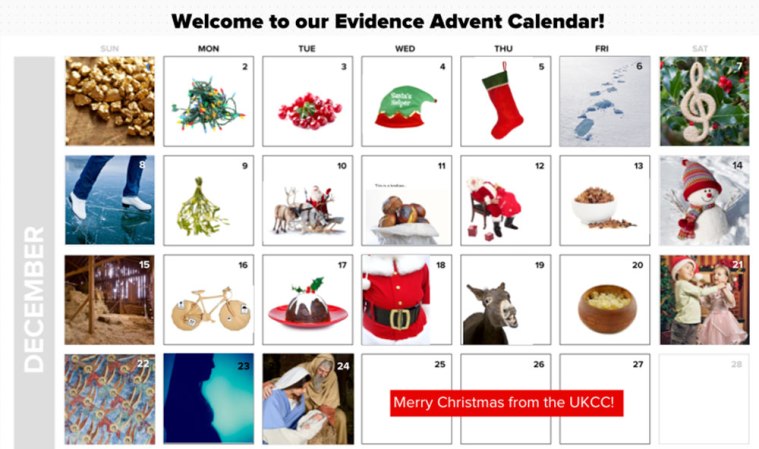Broken your New Year’s resolutions yet? Research from the US suggests just 8% of people achieve theirs and we know that if you’re hanging onto them into February you’re doing really well. When I thought about making a list of resolutions which clinical trialists and systematic reviewers might like to follow (the cheek of it!), it looked like a welcome distraction from deciding I’m going to take up running (again), eat only healthy snacks and get 10 hours sleep a night. But I find I am coming to this with a rising sense of sadness, disappointment and, well, outrage about some of the evidence gaps. Gaps which leave people struggling with health problems, and those trying to help them, without clear guidance on which interventions might help; and, indeed, on which may make things worse. Continue reading
An evidence advent calendar!
It turns out that Cochrane’s for Christmas, not just for life, with evidence in the Cochrane Library on all manner of festive things from gold, frankincense and myrrh to stockings! Ok, some of the links are a bit tenuous, but we hope you’ll enjoy our advent calendar.
Owing to some trouble with the technology elves, we couldn’t make it interactive (boo!) but each day we’ll post some Cochrane evidence related to the day’s picture, below the calendar. If you think of any others, do share them via the comments box.

Take a look: better diagnosis in pancreatic cancer
Key message: When CT scan shows a pancreatic or periampullary cancer that looks like it can be removed by surgery, having diagnostic laparoscopy may decrease the rate of unnecessary surgery by giving more information about whether this is likely to be so.
Pancreatic Cancer Awareness Month is drawing to a close. It’s been an opportunity for Pancreatic Cancer Action to raise awareness of a disease which is the fifth leading cause of cancer death here in the UK, where survival rates are among the worst in Europe and have not changed in over 40 years. The good news is that a new Cochrane review from the Cochrane Upper Gastrointestinal and Pancreatic Diseases (UGPD) Group has just been published with evidence that a diagnostic technique, laparoscopy, may help to reduce the number of people undergoing surgery unnecessarily. Continue reading
Flu, chills and other ills: a wintry round-up of Cochrane evidence
This week it really feels like winter is upon us and infection is the dominant theme in this blog, which gives you a round-up of some new and updated Cochrane reviews on flu vaccination; antibiotics for colds, sore throats and for those having feeding tubes put in; bringing down your poorly child’s temperature and whether avoiding lactose is helpful when diarrhoea strikes. Continue reading
Managing diabetes: new evidence on targets for blood pressure and blood glucose
Key messages:
1. Current evidence does not support blood pressure targets lower than the standard targets for people with raised blood pressure and diabetes
2. Better evidence is needed to guide the choice between targeting intensive or conventional glycaemic control in people with type 2 diabetes but intensive control increases the risk of both mild and severe low blood sugar
Today is World Diabetes Day and there’s a big emphasis on knowing the complications of diabetes and trying to avoid them. Maintaining healthy blood pressure levels and blood sugar levels are important ways to reduce the risk of damage to the heart and blood vessels, kidneys, nerves and eyes. We have new evidence from Cochrane systematic reviews which helps shed some light on which approaches might be best when it comes to setting targets for blood pressure and blood glucose levels. Continue reading
Migraine, art and medicine
There’s a man in my mum’s sewing box. Staggeringly handsome and, until recently, rather mysterious. I hadn’t expected to be writing about a mystery again quite so soon after learning of the woman who may have been the face of Resusci Anne, but today I’m back with new Cochrane evidence which takes some of the mystery out of medicines for migraine, plus a look at migraine art and the man behind it. The man whose face has nestled among the cotton reels for the past sixty years. Continue reading
A wake-up call on children’s well-being: do more, do it now
It’s official – the Chief Medical Officer is ‘profoundly ashamed’. In her report on child health, Professor Dame Sally Davies highlights appalling inequalities in the UK, with three times as many child deaths in the poorest areas compared with wealthier regions, and shows us to be a nation lagging behind our European neighbours too. Much more needs to be done to improve the health of Britain’s children and it needs to be done sooner, she says. Early, preventive action rather than reaction will benefit both the health and the wealth of the nation. I thought I’d take a look at where Cochrane evidence might fit into her vision of what needs to be done. Continue reading
3 things to help people with COPD keep well and keep out of hospital
Today I have some good news about chronic obstructive pulmonary disease or COPD. This is an umbrella term covering a number of conditions, including chronic bronchitis and emphysema, where people have difficulty breathing because of lung damage. Smoking is by far the biggest cause of COPD, but environmental factors and genetics can also play a part. It’s a common, debilitating and life-threatening condition. It’s a global problem and in the UK it’s the second highest cause of hospital admission. COPD places a huge burden on the patient and on healthcare budgets, with much of the costs due to treatment in hospital. We need some good news on this and some good evidence to guide decisions about managing COPD.
So, what is the good news? We have a bunch of new and updated reviews from the Cochrane Airways Group which have some decent evidence to guide us on some things that work with respect to managing COPD. Continue reading
A mystery, missing evidence and some answers!
Contrary to what you might expect, you’ll have to wait until the end for the mystery, though in truth missing data and important questions that remain unanswered could also be labelled as that, and this is where I start.
My last blog was a round-up of new and updated reviews on asthma and I begin this one with another offering from the Cochrane Airways Group (do these people never take a day off?). It’s another tale of what we still don’t know, this time about a class of anti-inflammatory drugs called anti-leukotrines. For managing mild persistent asthma in children, low-dose inhaled corticosteroids (ICS) are recommended, but if symptoms aren’t well controlled with ICS then anti-leukotrines may be added. Almost ten years ago, a Cochrane review was published which pulled together the available evidence on the safety and effectiveness of this treatment for adults and children and found very little to go on, with just two small trials with children. Now a review has been published which looked for trials involving children (any age below 18) and finds we’re not much further on.
Exercise and asthma: what does the evidence say?
Some people with asthma find their symptoms are worse when they exercise, or restrict their physical activity for fear that this will be so. Others report that their asthma symptoms are better when they are fit. Several reviews from the Cochrane Airways Group have recently been published on aspects of exercise for people with asthma. Continue reading

